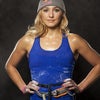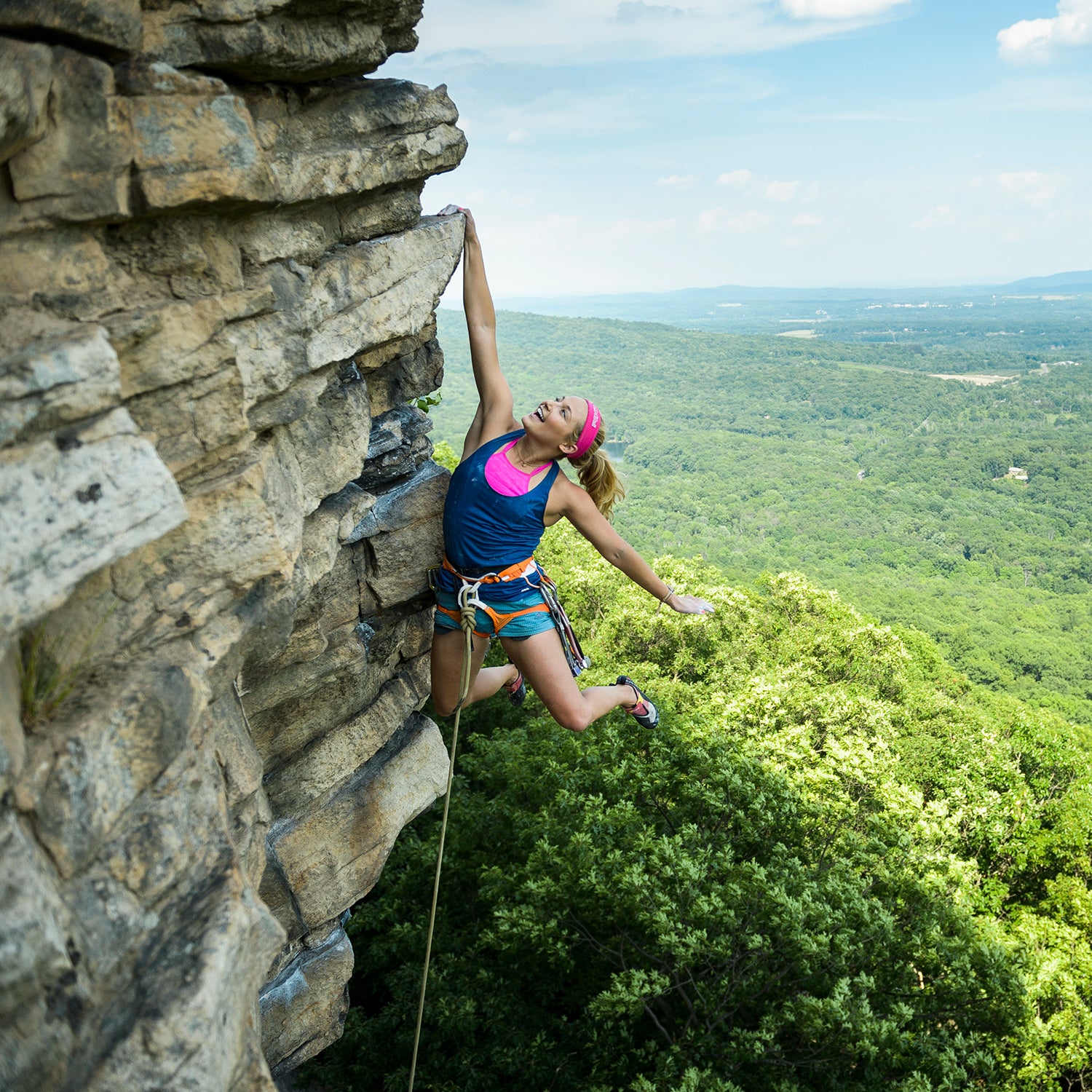There’s a simple rule in athletics that I live by: in order to break plateaus, you need to change your approach. So in June, having recently graduated from Columbia University and looking to accomplish a first ascent big-wall objective in Brazil later in the summer, that’s what I set out to do.
For elite athletes, mental fortitude is just as important as physical ability. And for me, it will become even more crucial as I look to tackle moreÃ˝multi-pitch routesÃ˝that require hours of intense concentration. Big walls present more riskÃ˝than gyms: having a strong, confident, and level-headed mind is key.Ã˝
To sharpen my mind, I spent a week at called Performance Under Pressure. Put on by Red Bull, one of my sponsors, the camp was started in 2007 by Andy Walshe, the company‚Äôs director of high performance who holds a Ph.D. in applied biomechanics, or human movement studies.Ã˝The energy drink company hosts a handful of camps like this: there‚Äôs Breath-Hold where athletes trainÃ˝to hold their breath under water for up to five minutes; there'sÃ˝Project Acheron: Snow, which challenges athletes duringÃ˝a trek across the difficult terrain of Patagonia.Ã˝The camp I went to isÃ˝designed to push performers outside of their comfort zones so they‚Äôre prepared to mentally handle any situation.
In the weeks leading up to PUP this summer, I had absolutely no idea what to expect. I‚Äôd heard good things from other Red Bull athletes about the camp, which is why I'd signedÃ˝up. Part of the idea is that you aren‚Äôt supposed to know what you‚Äôre about to go through: all I was given beforehand was a plane ticket to Kalispell, Montana, and a packing list: exercise clothes, warm clothes, bathing suit. I envisioned stationary bikes and treadmills lined up to test pure fitness‚Äîlinear, obvious activities that would be challenging but strictly physical.
I was wrong.
When I arrived in Montana, my driver drove me to a large wooden cabin at Whitefish Lake. It turned out I was one of eight athletes at the camp: Angel and JohnnyÃ˝Collinson, Ian Walsh, Izzi Gomez, Miles Chamley-Watson, JT Homes, Angela Naeth, and Mike Hucker were there, too. Everyone was finishing dinner and settling in for an early night. Our morning would start at 5 a.m.
Key to performing as an elite athlete is mental fortitude. It’s as important as physical ability, if not more so.
When we woke the next day, we gave saliva samples to Andy (more on this later), then we loaded onto a bus that took us up a steep mountain roadÃ˝into a forest. Awhile later, weÃ˝unloaded and began a four-mile hike on a trail through the woods, emerging at a lookout: we were on top of a mountainÃ˝overlookingÃ˝a misty river and lush valley below. There we found mats laid out in the grass field and we all did an hour of yoga. That was the last familiar thing we did, and the momentÃ˝when camp began in earnest.Ã˝
PUP activities are unique, to say the least. In one, called the Breath of Fire, we were blindfolded and instructed by Cirque du Soleil trainers to hop around and chant, inhaling and powerfully exhaling so much that my head burned from my temples to my nostrils. In another, decorated Special Ops soldiers taught us how to fire MC4 caliber rifles, then ran us through a series of agility drills involving target practice and detonating hidden explosives. We practiced meditative breathing exercises while submerged in ice baths. We performed emotions onstage‚Äîcrying on command, acting out hate‚Äîalone andÃ˝in front of the group. We interacted with a live grizzly bear. The final day of camp involved a 29-mile rafting trip through Class IV rapids.Ã˝
‚ÄúUsing uncommon stressors creates a far greater response in the person and allows us to manipulate training more effectively as well as give the athletes greater opportunity to practice the self-regulation techniques,‚Äù Andy says. In other words, they want to target our ability to handleÃ˝the unknown and unexpected and to get comfortable acting on impulse alone. The goal is to induce vulnerability and exposure in order to train us to perform confidently under pressure.Ã˝‚ÄúIn any situation where you‚Äôre highly activated or stressed, the ability to reset‚Äîget back to the ideal state‚Äîis a key performance skill,‚Äù Andy says.Ã˝
To measure our physiological responses, weÃ˝wore heart-rate monitors and swabbedÃ˝saliva twice a day, to test cortisol levels. WeÃ˝answered daily questionnairesÃ˝about our reaction to the drills and exercises. Top sports psychologists used these to analyze our daily levels of stress, mental awareness, energy output, and personal character traits. Each evening, we met with the High Performance Science team to review the data.
Stress‚Äìboth physical and psychological‚Äìcauses increases in serum cortisol levels. Therefore, by measuring our cortisol levels from the time that we woke up to the time we went to bed, the team could see how our levels changed, depending on what we did during the day. Then, at the end, theyÃ˝comparedÃ˝the changes and concluded which exercises caused the mostÃ˝stress.
Sometimes, it’s easier to test yourself physically rather than emotionally. For instance, I feel much more comfortable hanging from the side of a cliff thousands of feet off the ground than I do standing solo on a stage in front of accomplished athletes with nothing by my side and having to act out emotions. Yet controlling those emotions is extremely important in high-stress situations. When fear creeps in, whether rational or irrational, it can overtake you. For instance, in climbing, being afraid to fall when your gear placement is well below you, it is easy to freeze up, almost like paralysis. When I can eliminate my fear of falling and can just focus on the next move in front of me, I excel.
The first step to achieving a goal is believing in yourself enough to commit yourself wholeheartedly.
Since Montana I have been working on the ‚Äúfour-count breath,‚Äù which means taking a four-second inhale, holding it four seconds, exhaling for four seconds, holding for four seconds, thenÃ˝repeating for four minutes. I do it when I wake up each morning and before I go to bed at night. It‚Äôs designed to minimizeÃ˝overall stress levels,Ã˝and I find it's effective at doing so.Ã˝
I‚Äôm also developing a mantra‚Äîthe repetition of a word of phrase to aid in concentration. When I come into a difficult situation while climbing I want to have a few go-to phrases to control my concentration. For instance, when I am feeling really tired on the wall and in the middle of a hard sequence, I repeat ‚ÄúI can, I can,‚Äù while breathing in and out in a way to slow my heart rate. When I am approaching a dynamic sequence, I tell myself ‚ÄúJust go,‚Äù in order to avoid hesitation. Breathing and heart-rate levels are directly correlated, so having go-to tactics to be in control of your breath enables better heart-rate mastery.Ã˝
The spontaneity of camp reinforced the idea that all I could control was how I approached each day. It's interesting to apply to daily life thisÃ˝concept of being okay with not knowing the plan. Uncontrollable situations breed doubt. The way to beat doubt is by exerting control and commitement‚Äîand by learning that the only elementÃ˝I can control is my reaction to aÃ˝situation. In order to suppress doubt about my ability to perform under pressure, I had toÃ˝be in control of myself‚Äîand let everything else go.Ã˝
PUP served as a reminder to check in on myself and make sure that all systems are go: performance is not just physical. In order to improve, it is important to consider the mind.Ã˝
Camp was also a personal journey. I realized that I am afraid of not reaching my full potential. This fear of failure is inhibiting. What I am learning to recognize is that I am only going to optimize myself when I fully accept myself. This is tough. As athletes, we all go through highs and lows. Being okay with low points in my climbing is tough to overcome, but recognizing the present and moving forward with future goals is the only way to process the now. Otherwise, I end up in a rut where I plateau and doubt myself and my ability to push past the obstacle, stronger than before.Ã˝
The first step to achieving a goal is believing in yourself enough to commit yourself wholeheartedly to the task. Nothing we attempt is ever certain. But we can be certain about what we want and what we choose to commit ourselves to.Ã˝


